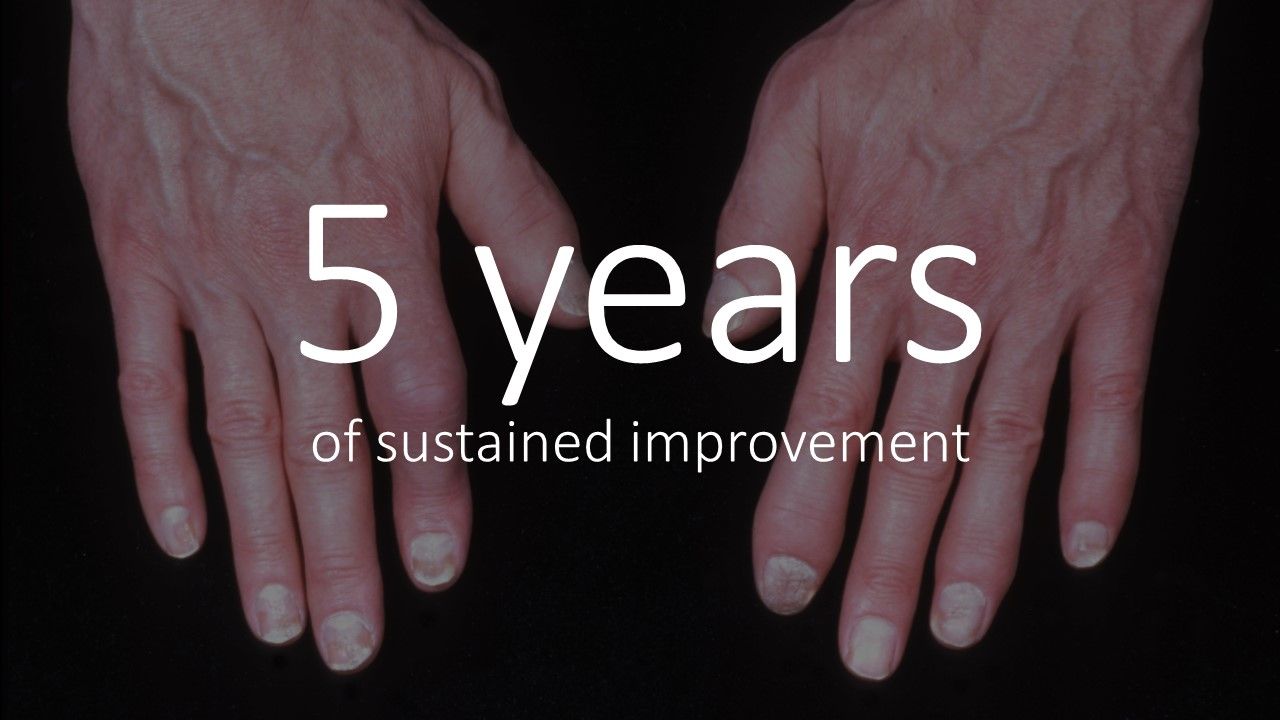Article
Secukinumab Benefits in Psoriatic Arthritis Persist for 5 Years
Author(s):
Secukinumab (Cosentyx, Novartis) provided sustained improvements through five years in the signs and symptoms of psoriatic arthritis with no new safety signals, say researchers recently writing in ACR Open Rheumatology.
(©MedicalIllustrations.com, 01B0W1EW)

Secukinumab (Cosentyx, Novartis) provided sustained improvements through five years in the signs and symptoms of psoriatic arthritis with no new safety signals, say researchers recently writing in ACR Open Rheumatology.
Psoriatic arthritis, which affects around 1 percent of the general population and 30 percent of patients with psoriasis, can negatively affect patients’ daily functioning and quality of life as a result of permanent joint damage and disability. Recommendations from the European League Against Rheumatism (EULAR) and the Group for Research and Assessment of Psoriasis and Psoriatic Arthritis (GRAPPA) recognize targeting the proinflammatory cytokine ILâ17A as a therapeutic strategy to manage all the main clinical manifestations of psoriatic arthritis. In the FUTURE 1 study, secukinumab, a human monoclonal antibody that directly inhibits ILâ17A, provided rapid and significant improvements in all key clinical manifestations of psoriatic arthritis with improvements sustained through three years. These clinical benefits were observed in patients naïve to biologic therapy and in those with an intolerance or inadequate response to agents targeting tumor necrosis factor (TNF) 3, 8, 9, 11, 13-16.
“Here, we present the final fiveâyear efficacy and safety results, including efficacy results in patients who had a dose escalation from 150 to 300 mg during the study,” wrote the authors of the study, led by Philip J. Mease, M.D., of the University of Washington in Seattle.
Following that core two-year phase of the trial, 236 patients chose to participate in the three-year extension phase and received 150 mg of subcutaneous secukinumab every four weeks, escalating to 300 mg if needed. Overall, 81.8 percent of patients in the secukinumab 150âmg group completed five years of treatment, of which 36.4 percent had dose escalation from 150 mg to 300 mg.
At five years, 71 percent, 51.8 percent, and 36.3 percent of patients achieved American College of Rheumatology (ACR) 20, ACR 50 and ACR 70 responses, respectively. Efficacy improved in patients requiring dose escalation from 150 mg to 300 mg and was comparable with those not requiring dose escalation.
“Improvement in ACR and PASI responses was achieved in patients who escalated from secukinumab 150 to 300 mg, indicating a benefit of dose escalation in patients who require additional control of symptoms,” the authors wrote.
Secukinumab treatment was efficacious in both patients who were anti–TNFânaïve and anti–TNFâinadequate responders (IR), with clinical responses generally higher in anti–TNFânaïve patients than in anti–TNFâIR patients. “These results support the effectiveness of longâterm treatment with secukinumab for biologicânaïve patients as well as for patients who have previously failed antiâTNF therapy,” the authors wrote.
Exposureâadjusted incidence rates for selected adverse events per 100 patientâyears for any secukinumab dose were 1.8 for serious infections, 0.2 for Crohn's disease, 0.9 for Candida infection, and 0.5 for major adverse cardiac events.
“With no new safety concerns over a treatment period of up to five years, results from the fiveâyear phase 3 FUTURE 1 study support the longâterm efficacy, safety, and tolerability of secukinumab in the treatment of patients with psoriatic arthritis,” the authors wrote.
REFERENCE
Philip J. Mease, Arthur Kavanaugh, Andreas Reimold, et al. “Secukinumab Provides Sustained Improvements in the Signs and Symptoms of Psoriatic Arthritis: Final 5âyear Results from the Phase 3 FUTURE 1 Study.”ACR Open Rheumatology. November 14, 2019. https://doi.org/10.1002/acr2.11097




